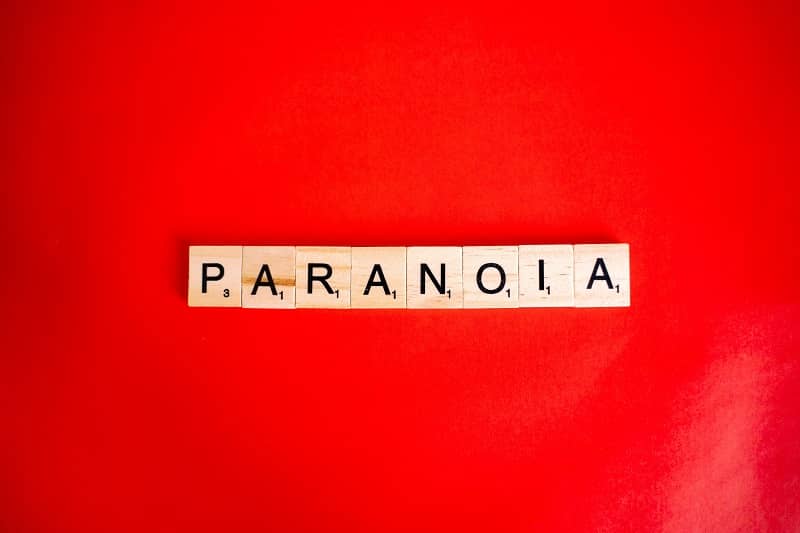
18 Jun Early Signs of Paranoid Personality Disorder and Coping Strategies
Paranoid personality disorder is a challenging mental health condition impacting between 2 to 4% of the population.
The symptoms often include strong feelings of mistrust and suspicion that even interferes with daily activities.
Someone with the disorder might always end up questioning your faithfulness, no matter how strong your bond with them might be.
Moreover, when they start believing that you’re persecuting or have rejected them, they might respond with a lot of anger.
Hence, being in a relationship with someone who has a paranoid personality disorder can be really stressful and jarring at times.
But despite the challenges, one could still deal with the symptoms with the help of loved ones.
Since the disorder usually shows up during early childhood, understanding its symptoms can be really helpful in the treatment.
Paranoid Personality Disorder – Early Signs and Symptoms

Paranoid Personality Disorder (PPD) is a disorder that generally appears first in early childhood and is more common among men.
According to researchers, the condition is most prevalent in people with a genetic history of schizophrenia.
6 early signs that show a person is suffering from Paranoid Personality Disorder (PPD):
- Suspecting people of harm and betrayal without any explanation.
- Doubting their close ones with a lack of loyalty and trustworthiness.
- Keeping their guards up all the time and not confiding in anyone because of the fear of their sensitive information being leaked.
- Even innocent gestures and convos make them interpret some malicious intent.
- Over sensitiveness to insults and criticism.
- Responding to their perceived misconceptions with anger.
Apart from these symptoms, an individual’s involvement in his/her relationship can also be an indicator of the disorder.
As a matter of fact, it can often be difficult to detect the symptoms of this disorder unless they become severe.
Maybe because most of us have, at least once in our lives, been through situations where we have acted like a PPD patient.
Or maybe because these symptoms coincide with other mental disorders like obsessive-compulsive disorders.
Hence, the best way to confirm the disorder is by visiting a doctor for a diagnosis.
Diagnosis of Paranoid Personality Disorder
While there’s no such specific paranoid personality disorder test that can confirm the disorder in one go, the doctors usually conduct various tests to rule out possibilities of any other causes behind the symptoms.
These tests are conducted based on medical history and examination for other mental disorders.
In most cases, docs refer such patients to psychologists and other mental health professionals for an evaluation.
These specialized doctors have special aptitude tests that help in the diagnosis of the disorder through interviews.
During such evaluations, you can expect questions about childhood, school, work, and relationships.
The major aim of these tests is to find out how a person reacts to situations and treatment plans.
Once the diagnosis is complete and the disorder is confirmed, the next step is to treat the patient. In most cases, a PPD sufferer never reaches this stage as the basic nature of the patients doesn’t let them seek professional help.
However, their close friends and loved ones can encourage them to go for suitable treatments.
But convincing them is only possible when you know how to deal with someone with a paranoid personality disorder.
How to Deal with Paranoid Personality Disorder?

There are many tried and trusted strategies for managing and treating PPD, but this could be difficult.
The difficulties usually arise because of the distrustful and fearful feelings accompanying the disorder.
While the difficulties are always there, the strategies always work out in the end.
Hence, make sure you try out the following methodologies to help out your loved ones or even yourself.
How to Deal with Paranoid Personality Disorder? [Professional Treatment]
First off, a person with a paranoid personality disorder often believes that his way of thinking is apt!
He might not realize that his conceptions are actually disordered.
In such cases, medical treatment helps kickstart positive recovery and changes in his thought patterns.
Treatment from a professional helps the patient receive a careful and accurate solution for his problems. Their primary goal is to eradicate the patient’s fearful thoughts and perceptions.
These treatments usually involve:
[vc_accordion style=’accordion’] [vc_accordion_tab title=’#1. Art and Creative Therapies‘ icon=” icon_color=”]These therapies usually use arts and other forms of creative activities to help patients express their feelings.
They are usually helpful when patients have difficulties in opening up about their experiences.
[/vc_accordion_tab] [vc_accordion_tab title=’#2. Talking Therapies‘ icon=” icon_color=”]These therapies help the patients build coping strategies to overcome their negative thoughts.
Cognitive Behavioural Therapy
CBT is ideally effective in making patients understand that their conceptions are disordered.
It helps them redirect their thoughts before the thoughts start influencing them to go on the wrong path.
During CBT, you get to examine the way you think and look for different interpretations of those thoughts. It also reduces the anxiety and the stress that usually accompanies paranoia.
Other Talking Therapies
Most other talking therapies can also be used for treating PPD:
- Psychodynamic therapy
- Counseling
- Family therapy
While medications are generally not used to treat PPD, doctors might prescribe anti-anxiety, anti-depression, or antipsychotic drugs.
This is usually done when the symptoms are quite severe. Often, talk therapies with these medications prove out to be useful when treating PPD.
[/vc_accordion_tab] [/vc_accordion]
However, there are many challenges for a person with PPD in trying to embrace a willingness for medical treatment.
You cannot even force such a person to seek help for PPD as it might backfire and make the symptoms worse.
Another challenge in overcoming the sufferer’s PPD is to convince him that the people around him are helping him.
If your friend or partner is not ready to trust the therapist, the treatment might not work. Thus, convincing the patient for treatment might take a lot of time and patience.
Hence, for the time being, you must know how to deal with paranoia attacks and with your loved one’s PPD.
To help you out with the same, here are some coping strategies that you can implement.
How to Work with Someone with Paranoid Personality Disorder? [7 Coping Skills]

You might feel unsure about how to deal with someone who has a paranoid personality disorder.
It’s quite normal and healthy to feel a range of emotions.
Hence, you can follow the below-mentioned coping strategies to make your friend comfortable before you convince him to get treated:
#1. Consider Their Beliefs to be Justified
People often dismiss the thoughts of a paranoid friend if they don’t agree with them. But what if those thoughts were actually justified?
Make sure that you don’t consider their thoughts as delusions as they might be justified and true.
#2. Think About the Basis of Those Beliefs
Paranoid thoughts usually develop because of anxieties about real situations. Hence, try exploring the reasons behind their beliefs.
This can help you understand the cause behind the PPD.
#3. Talk Openly
People with PPD often isolate themselves, but talking to them can actually ease their pains.
In fact, sometimes your opinions can actually reassure them to feel better.
#4. Don’t Dismiss Their Fears
Even if you don’t agree with your friend’s fears, try listening to him/her.
You must at least pretend in front of them to accept the fact that their fears are real.
#5. Focus on Their Feelings
Focus on their pains and discomfort. You might not agree with the reason that makes them uncomfortable, but recognizing their feelings would break the cycle.
It would deal with their agitation and distract them from their paranoid thoughts.
#6. Encourage Them to Seek Help
You cannot force someone to seek help if they don’t want to. Thus, talking to them about asking for help is okay.
Encourage them to seek help if they feel things are getting out of hand.
#7. Be Prepared in an Emergency
There might be a situation where you realize your friend is suffering from a mental disorder, and it’s severe. Don’t panic!
In such cases, you can suggest some crisis plans for them to cope with their discomfort.
Hence, be ready with any emergency help they might need.
But what if it’s a romantic relationship?
Things get pretty heated up and serious when it comes to matters of the heart. And such distrustful behavior of a partner can be painful and jarring at times.
In such a situation, you will often need special measures to help your partner and yourself.
How Does Paranoid Personality Disorder Affect Relationships?

Loving someone with a paranoid personality disorder often turns out to be traumatizing.
Whether it’s your spouse, partner, or family member, PPD takes a heavy toll on relationships.
The usual ups and downs of relationships get intensified when your partner suffers from a disorder like PPD.
They fail to understand the gravity of their mistaken perceptions. Hence, their imaginations gradually become their reality.
This imbalance between their thoughts and the actual reality of their partners poses many challenges in the development of the relationship like:
#1. Suspicion
A partner suffering from PPD is often resistant to trusting your actions. They might even not believe the proof of your whereabouts and activities when you are not together.
Such partners might often doubt your expression of love too.
#2. Criticism
Partners with PPD are often judgemental and might show verbal insults and criticism for your efforts.
In fact, they might even accuse you of things that you have never done.
#3. Stubborn Nature
Due to their mistaken perspectives arising from their disorder, they often develop grudges against the people they love.
They often have strong false ideas about a person even if the person does something good.
#4. Pessimism
People with PPD often develop a negative attitude blocking out all the happy moments from their lives.
In fact, cases have been seen where people start believing that someone is trying to harm them.
#5. Secrecy
They often shield their feelings from others and hide things from their close ones. Because of this behavioral tendency, they also believe others are doing the same.
#6. Dominant Nature
Sufferers often believe that they need to control the people around them. That prevents them from having a healthy relationship with family and friends.
#7. Paranoid Nature
They are constantly anxious about their partner’s loyalty. In fact, they might doubt themselves of being loyal.
This calls for effective measures to deal with your partner and manage your own feelings around these behaviors.
How to Deal with Paranoia in a Relationship?

You can help your partner access their personal strengths and healthy habits whether they are alone or with you.
But here the process of dealing with the disorder would be different.
Here, you’ll have to get actively involved with a couple of therapists and counselors, and you would be helping your partner with the treatment.
So, how to deal with paranoid personality disorder in a relationship?
You just need to visit a counselor who will help you navigate through the following challenges:
#1. Setting Boundaries with Your Partner
Your partner with PPD needs compassion, but that doesn’t mean you let them treat you poorly.
A therapist will help them as well as you in drawing boundaries.
He will help your partner understand that your expectations matter too.
Apart from this, you also need to understand that your individual needs matter, and you don’t need to compromise that.
#2. Self-Care
Self-care practices spread a lot of positivity. Ultimately, both of you need some self-care, but it’s gonna be you who starts these habits.
This will encourage your partner to follow up.
#3. A Healthy Social Life
PPD isolates the sufferer as well as his partner from the social world. Isolation usually causes more turbulence in your mental health.
Hence, make sure you pay attention to your social connections.
Remember, it will be tough and illogical to accuse your partner of disordered thinking bluntly. But with the right guidance, you can bring in some awareness about these thoughts and work on them together.
Connect with the experts on how to deal with a paranoid partner to know more about the same.
What’s important at the end of the day to deal with a paranoid personality disorder is to know how to talk and placate the one with the symptoms while learning to work with them. Also, knowing you cannot use the same language or exhibit similar fears is all the more important when dealing with your partner.
Q&As
If any of your questions were not answered above, dig in through the following to find your answer.
#1. What triggers paranoid personality disorder?
PPD is common among people who have a family history of schizophrenia.
Apart from this, childhood experiences like physical and repressed emotional trauma can also be significant triggers of PPD.
Sleep disorders can also be active triggers of the disorder along with some medicinal side effects.
#2. Does paranoid personality disorder get worse with age?
PPD usually improves when a person goes from a youthful age to his prime. But as a person is aging or getting old, the condition may worsen. Hence, it follows a peak form of a graph and not a straight one.
#3. How do you respond to paranoid accusations?
The best ways to do so is by:
- Avoiding any arguments with the person about what they are so paranoid about.
- Let them know that you understand why they are afraid or fearful.
- Show them that you are with them and you support them no matter what happens.
#4. How common is a paranoid personality disorder?
This disorder usually begins in early childhood and is more common among men than women. According to studies, it affects 2 to 4% of the population.
#5. Can a person with paranoid personality disorder become violent?
Yes, a person with PPD can show strong counterattacks in defense or even in the form of stubbornness. They can show violence in anger fits.
#6. What is the difference between paranoid personality disorder and paranoid schizophrenia?
There’s a slight difference.
Schizophrenia affects a person’s ability to perceive things and often causes hallucinations and delusions.
However, PPD makes a person doubtful of the thoughts of another person, perceiving their every move with distrust.



No Comments